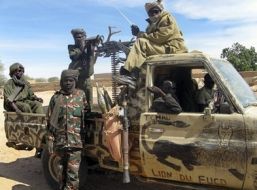Chad rebels say divergence over leadership behind assault failure
February 17, 2008 (NDJAMENA) — Chad’s rebel groups have acknowledged that the failure of their assault on the capital is largely due to their divergence over the who would be the head of state vowing to learn the lessons of their defeat and select a common leader in their fight against President Idriss Deby Itno.
 The principle reason for the failure of rebel attack against the presidential palace was the last minute divergence among them on who will be proclaimed president of the state. Mahamat Nouri, Goran ethnic group, and Tom Erdimi, a Zagawah were the two contenders for the presidency.
The principle reason for the failure of rebel attack against the presidential palace was the last minute divergence among them on who will be proclaimed president of the state. Mahamat Nouri, Goran ethnic group, and Tom Erdimi, a Zagawah were the two contenders for the presidency.
“We have decided not to return to Ndjamena without having a single leadership,” Abderaman Koulamallah, a spokesperson for the rebel alliance, said on Friday. He further said a commission had now been set up comprising the leading members of the groups to “decide on a consensus leader as quickly as possible.”
Assessing the causes of their rout in Ndjamena two weeks ago, the groups say they now recognise the need for a single leadership — despite the expected difficulties of uniting their fractious movements behind one.
Under pressure from Sudan, which allegedly arms them, the groups had previously agreed to form a military alliance under a joint command, but without a common leader.
“We need to agree to a political union,” said General Mahamat Nouri, leader of one of the rebel groups, the Union of Forces for Democracy and Development (UFDD), who is believed to be eyeing the leadership post.
The rebel alliance seized large chunks of Ndjamena and surrounded Deby in the presidential palace on February 2-3, but government troops — given logistical and intelligence support by the French military — repulsed the fighters, who have since withdrawn to the southeast of the country.
FAILURE IS DUE TO STRUGGLE OVER PRESIDENCY
Although they claim officially that their forces were well coordinated during the assault on Ndjamena, which began on January 28, some of those involved indicate that the three-headed leadership was one of the reasons for failure.
“One of the columns didn’t really get involved,” said one senior member of the Assembly of Forces for Change (RFC) group pointing to a UFDD-led operation that was supposed to bring supplies and reinforcements from the east of the country.
“They took far too much time. We had to abandon our positions in the city because we didn’t have a single round of ammunition.”
According to him, the mix of soldiers from the three groups in battle columns also contributed to the failure of the offensive. “Some people responded to the head of their movements but not the head of their column,” he said.
During their retreat toward Chad’s south-eastern border with Sudan, the rebels formed back into columns composed entirely of their own rebel groups, he said.
The search for a single leader to unify the rebel movement is likely to be a struggle however, as illustrated by an incident in Ndjamena.
“In Ndjamena we wanted to send out a radio message,” said Nouri, “but we were unable to agree on which leader was going to read it out.”
He added that “after the fall of the regime our objectives are different.”
Hailing from the same Goran ethnic group as former Chadian president Hissene Habre, who was overthrown by Deby in 1990, Nouri is clear about his suspicion of the RFC. The group is led by Timan and Tom Erdimi, the nephews and former chief of staffs of Deby.
“Chad cannot continue to be governed by one family or tribe,” Nouri said.
He is suspected of wanting to reassert the power of fellow Gorans and is also seen by critics as Sudan’s puppet.
The third rebel group is the United Front for Change (FUC), led by Abdelwahid Aboud Makaye.
“I am not the candidate of Sudan, which supplies all the rebel groups,” said Nouri.
A member of the RFC also said that support from Khartoum was now reaching all rebel groups.
“The Sudanese have supported Nouri a lot but now, after the defeat in Ndjamena, they are supplying us in the same way,” he said.
Sudan denies supplying the rebels.
Even though the idea of choosing a single political leader is supported by all sides, in practice it is likely to prove difficult and could be explosive if the rebel groups ever succeeded in overthrowing Deby.
“If we had seized power at the beginning of February, there would have been a period of hesitation,” the RFC member acknowledged.
(ST)
(Some information for this report provided by AFP)
